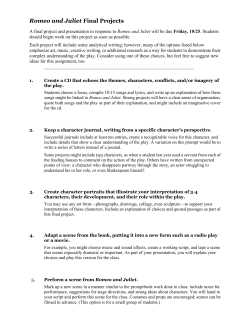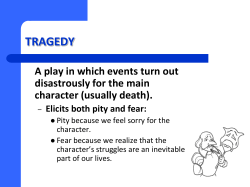
Paving the Pathway: building research writing capacity for pre-doctoral candidates
Paving the Pathway: building research writing capacity for pre-doctoral candidates Juliet Lum HDR Learning Skills juliet.lum@mq.edu.au Where we’re going 1. The Macquarie Model PhD pathway 2. The Research Communications unit 3. First run: design, delivery and evaluation 4. Revisions & possibilities A new PhD Pathway: the MQ model • replaces Honours • is recognised internationally (consistent with the ‘Bologna model’: 3+2+3) • offers more intensive & comprehensive research training http://hdr.mq.edu.au/information_about/research_training_degrees The Research Communications unit • • • • • The “flagship unit” of the MRes program Compulsory for all MRes students Taught centrally Taken in Year 1 Graded (high stakes) Design challenges • • • • • • mixed discipline cohort early timing multiple expectations mixed culture cohort mixed ability cohort staffing … and no precedent for this sort of course! So, how did we do it?! Unit description MRES700 aims to help [students] to understand the relationship between research communications and disciplinary knowledge creation, and to develop skills appropriate to the effective communication of academic research. During the course of this unit, [students] analyse, reflect on and practise different academic genres in a variety of modes (written, oral and visual), across disciplines and for both specialised and general audiences. Unit description MRES700 aims to help [students] to understand the relationship between research communications and disciplinary knowledge creation, and to develop skills appropriate to the effective communication of academic research. During the course of this unit, [students] analyse, reflect on and practise different academic genres in a variety of modes (written, oral and visual), across disciplines and for both specialised and general audiences. Unit description MRES700 aims to help [students] to understand the relationship between research communications and disciplinary knowledge creation, and to develop skills appropriate to the effective communication of academic research. During the course of this unit, [students] analyse, reflect on and practise different academic genres in a variety of modes (written, oral and visual), across disciplines and for both specialised and general audiences. Unit description MRES700 aims to help [students] to understand the relationship between research communications and disciplinary knowledge creation, and to develop skills appropriate to the effective communication of academic research. During the course of this unit, [students] analyse, reflect on and practise different academic genres in a variety of modes (written, oral and visual), across disciplines and for both specialised and general audiences. Delivery (2013) 13 week unit: 1 hr lecture + 2 hr tutorial/week Staffing: 1 lecturer & 5 tutors Tutorial tasks & textbook (Swales & Feak 2012) Online components: ilearn unit; Turnitin; eReserve Assessment tasks (2013) Name Description Short written task Extended definition (own choice of term) Analysis task Features of a journal article (choose from 3 set texts); Cohesion analysis (set text) Extended written task Article Critique or Comparison of 2 articles (own choice of text) Oral Presentation 10 min presentation in pairs “Research Communication practices in your discipline(s)” Evaluation: responses What students liked What students didn’t like Revisions • • • • • • • discipline streaming timing staffing textbook & tutorial tasks assessment tasks online interaction range of genres & audiences Other possibilities • ↑ streaming (↓ “plenaries”); ↑ discipline specialist involvement • ↓ teacher-centric delivery of content; ↑ studentdriven learning activities • ↑ online discussion forums for reflections & resource sharing • ↑ communicating research in non-traditional genres (blogs, tweets, interview, animation…) … How would you do it? Questions / Suggestions juliet.lum@mq.edu.au
© Copyright 2025





















